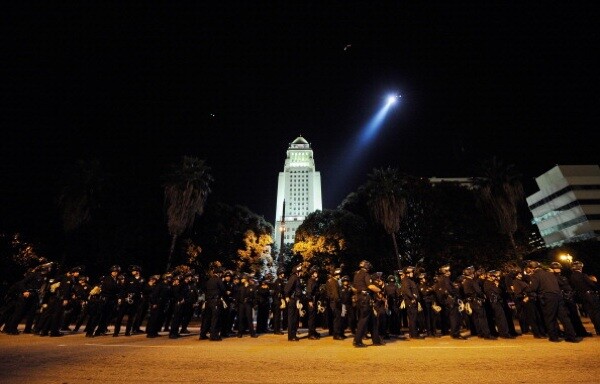'Constitutional Policing' or 'Taking Orders from Bank of America'?

Last Thursday I went to the L.A. Superior Court on Bauchet Street to attend the first court appearance for some of the people I was arrested with during our occupation on Bank of America's front porch in November. It turns out that, although we were arrested for trespassing, no charges had yet been filed.
Part of me was disappointed that I wouldn't be able to hear the legal arguments for and against the legality of our attempt to convene a peaceable assembly on a corporate owned patch of grass that is normally open to the public.
Oh, well.
A group of us decided to get some breakfast at Homegirl Cafe, just a few blocks away. I had taken my bike and so was the first at the restaurant. I went inside to tell the hostess that we were a group of about 10.
To my right, ordering something at the take out counter, was Commander Smith from the LAPD Public Information Office. He has been present and speaking to the media whenever there was a mass police action related to Occupy L.A.
I introduced myself, telling him who I was and whence I had come. He insisted I call him Andrew, and we chatted for a bit.
He told me a brief story of his experience of the day of our arrest that kept bouncing around my head. The next morning, I decided to write him a letter:
Dear Andrew, It was a pleasure making your acquaintance yesterday morning at Homegirl Cafe. I don't think I have ever been on a first name basis with a police officer before being arrested and "booked into the system" as a result of my participation in the Bank of America Plaza action on November 17. You are clearly a friendly and reasonable guy, so I was inspired to say hello. I have seen you several times over the last months around city hall and in the media speaking about protecting 1st Amendment rights and praising both the LAPD and protesters for remaining nonviolent. I appreciate these statements by you (and Chief Beck and Mayor Villaraigosa) because I think they set a decent standard for LAPD operations -- as civil servants, of course the police should be protecting civil rights. At the same time, however, these statements function to obscure the fact that, at the end of the day, non-violent protesters are being shackled and detained for exercising their rights to peaceably assemble and to petition the government for regress of grievances. On the night of the raid of the encampment at city hall, the Mayor's assertions about "one of the finest moments in the history of the LAPD" spread throughout the media while non-violent Occupy LA participants were were being detained (and thereby silenced) in inhumane conditions. So, for me, talk of "constitutional policing" opens up deep questions about the LAPD's role in policing 1st Amendment activities. To many of us in the Occupy Movement, Constitutional Bill of Rights protections regarding our fundamental civil liberties trump city ordinances regarding park rules (or even the power of property managers to decide to limit access to "public/private" parks). Of course, we did not get to discuss any of this in our short chat at Homegirl Cafe, but you did tell me a relevant story about how you were taken off guard when someone asked you during a televised interview that day how it felt to "take orders from Bank of America." Actually, I very much appreciate you being so open about this story--I realize you do not have to repeat such things to perfect strangers. But I can't help but wonder--what is your considered response to this challenging question? In the rhetoric of the Occupy Movement, it is almost an article of faith that though police men and women are part of the 99%, their job is to protect the interests of the 1%. We know that there is a two-tier justice system in the country at large, and that generally speaking law enforcement is directed most forcefully down the social ladder. Financial and political elites escape accountability for their crimes, even when such crimes are well documented and openly admitted. Oftentimes, instead of being punished for criminal activity, these elites are in fact rewarded. This kind of selective application of the law is of course the opposite of the rule of law. The General Assembly of Occupy LA has explicitly called for the prosecution of bank fraud and other financial crimes through a horizontal consensus building process in our now destroyed camp. The action at Bank of America Plaza was designed to focus attention on the institutions that get away with such crimes. But there has been no attempt to apply the law to these elite criminals. Of course, you may respond that such crimes fall outside the jurisdiction of the LAPD. But the Federal Justice Department has shown no interest in prosecuting these crimes. Ultimately, one of the only groups that seeks to hold these elite criminals accountable is the people whose peaceable assemblies are being broken apart by police departments in cities across the country. The Occupy Movement has demonstrated that in order for certain popular grievances to be formulated and heard, people must break low order city ordinances restricting assembly and access to privately managed public parks. In the interest of communication and understanding, I think it would be useful to hear what an articulate and reasonable police spokesman has to say on these topics. Sincerely and respectfully, Jason Rosencrantz
I haven't heard back yet from Commander Smith. I'm know he is a busy guy, so I'll be patient.
Jason Rosencrantz is a Downtown resident who has become an active participant in Occupy Los Angeles. Read his previous posts here.